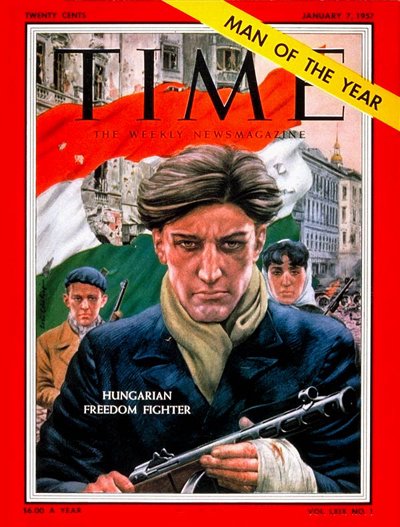Change language:
The 8 strongest international reactions to the 1956 Hungarian Revolution

The Hungarian Revolution of 1956 is an event of crucial importance for Hungarians, as, during its thirteen days, the nation united as one force against the Soviet Communist regime. However, the neglected nation’s uprising has had its impact on the whole world.
Elvis Presley
There is an Elvis Presley square and park in Budapest (near the Buda-end of Margaret bridge) in honour of the late singer’s efforts to help Hungarians who suffered heavy losses during the 1956 Hungarian Revolution. Presley appeared on Ed Sullivan’s talk show on 28 October 1956, where the host and the singer both drew attention to the bloody revolution that was taking place in Budapest.
The ‘King of Rock and Roll’ asked American citizens to aid Hungarians in their hardship, eventually raising over 52 million dollars by the end of 1957.
Presley was even named an honorary citizen of Budapest in 2011.
Time Magazine
Time Magazine named the Hungarian Freedom Fighter the Man of the Year for 1956, featuring not a photo, but an artist’s depiction of three Hungarian freedom fighters. The article accompanying the photo tells the story of the three men.

Camus & Sartre
A strong reaction was invoked in the great French philosophers too – Albert Camus criticised the West’s lack of action when it came to intervening in the Hungarian-Soviet conflict in an essay entitled The Blood of the Hungarians. Jean-Paul Sartre expressed his disappointment and outrage regarding the Soviet measures in the article Le Fantôme de Staline.
Worldwide sports events
As to show their support of the Hungarian revolution and their dismay of the Soviet side,
Spain, the Netherlands and Switzerland all boycotted the 1956 Melbourne Olympics.
A year later, Norway declined the invitation to the Bandy World Championship over the presence of a Soviet team.
The United Nations
The United Nations even created a board dedicated to investigating the circumstances of the revolution in January 1957. The Special Committee on the Problem of Hungary interviewed 111 Hungarian refugees, reviewed documents, newspapers, radio transcripts, photos, films that were created during the revolution, along with the written testimony of 200 other Hungarians.
Music – Italy and Finland
Two famous songs were written on the occasion and dedicated to the bravery of the oppressed Hungarians: one of them is from Italy, bearing the title Avanti ragazzi di Budapest (Onwards, boys of Budapest) and the other is from Finland, entitled Unkarin Vapaus (Hungarian Freedom).
The Hungarian girl who fought for freedom
On November 13, 1956, the Danish Billed Bladet featured the photo of Erika Szeles on its cover. The red-haired 15-year-old Hungarian girl was holding a Russian cartridge-disc rifle in her hands, with a look of determination and proud defiance in her eyes.
Her story, however, is quite tragic: by the time her photo spread around the world, she was already dead, shot on the 7th of November.
Italy, Alberto Moravia
A famous Italian writer, Alberto Moravia, suggested to the whole world that those streets where there were Soviet embassies, should be renamed ‘the streets of butchered Hungarians’.
Featured image: www.facebook.com/pg/magyarforradalom1956
Source: Daily News Hungary







